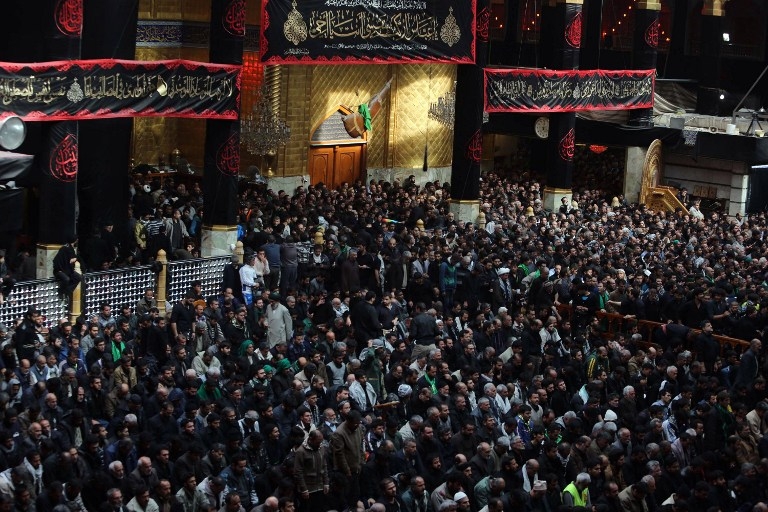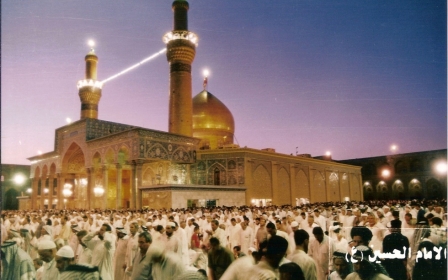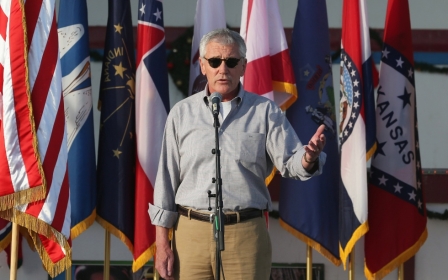Iraq security fears increase over Shiite pilgrimage

Millions of Shiite Muslim pilgrims thronged the Iraqi city of Karbala Friday for one of the world's largest religious gatherings, in defiance of the threat posed by the Islamic State, a Sunni group.
With just hours to go until the Arbaeen commemoration reaches its climax Saturday, a sea of black-clad devotees filled the streets, waving flags, beating their chests and chanting.
A mortar attack near the city earlier in the day killed one person and wounded four, highlighting the security concerns surrounding the annual event.
Nine rounds hit an area called Souk al-Basra, around seven kilometres from the city centre, a police colonel said, adding that the casualties were local residents and not pilgrims.
Record numbers of Shiite faithful have been converging on Karbala from across Iraq and other countries for Arbaeen, which marks the end of a 40-day period of mourning following the anniversary of Imam Hussein's death.
Hussein is one of the most revered figures for Shiites, who are the largest community in Iraq and the overwhelming majority in neighbouring Iran.
This year's pilgrimage has taken on a political dimension as it is the first since the devastating offensive IS launched in Iraq in June.
The militant Sunni organisation considers Shiites to be heretics and has made targeting the community one of its main objectives.
Defence Minister Khaled al-Obeidi said Thursday that 17 million pilgrims had come to Karbala for Arbaeen.
Brigadier General Qais Khalaf Rahim, head of operations command for the Karbala area, said "the number of visitors is far greater than last year's".
"We had to open more routes to Karbala and double the number of cars, buses and trucks transporting pilgrims to the city," he told reporters.
Grand Ayatollah Ali al-Sistani, the most revered Shiite cleric in Iraq, urged the authorities in his Friday sermon to be better prepared for such a huge influx of visitors.
Speaking through one of his representatives, Sheikh Abdelmahdi al-Karbalai, he said a comprehensive and scientifically sound plan should be devised to move "beyond chaos and improvisation".
Prime target
For days, millions of faithful have been converging on the holy city where Hussein was killed in battle and beheaded in 680 AD, entire families trekking for days on the roads and sleeping in the open.
Central Baghdad has been in lockdown mode much of the week as authorities restricted access and movement in order to avoid complete logjam and minimise the risks of major bomb attacks.
Three people were killed and four wounded earlier this week, when a bomb went off in Baghdad near one of the thousands of tents set up to serve food and beverages to marching pilgrims, security and medical sources said.
Three people also died on Friday during a stampede as they crossed the border from Iran, Iraq Red Crescent spokesman Haidar al-Jaberi said.
Two were elderly Afghans and the third was a five-year-old Iranian child.
However, given how exposed the pilgrims are and what a prime target they are for IS fighters, very few incidents have been reported so far.
Iraqi officials have stressed how crucial a recent military victory against IS militants in the Jurf al-Sakhr area has been in making the pilgrimage possible.
Middle East Eye propose une couverture et une analyse indépendantes et incomparables du Moyen-Orient, de l’Afrique du Nord et d’autres régions du monde. Pour en savoir plus sur la reprise de ce contenu et les frais qui s’appliquent, veuillez remplir ce formulaire [en anglais]. Pour en savoir plus sur MEE, cliquez ici [en anglais].




